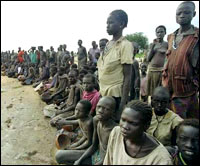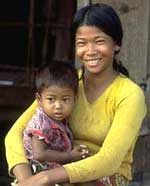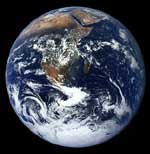Months ago, the United Nations decided to make an event out of the fact that the human population meter would soon click over another billion. They picked an arbitrary date — October 12 — and declared it the Day of 6 Billion.
What kind of event should this be? A day of repentance? A celebration? In a world of soundbites, what’s the right tone here? Six billion, oh woe? Six billion, yippee?

Six billion. But who’s counting?
My guess is that “oh woe” will rule the day. That’s how we’re used to talking about ourselves. Overpopulation, population bomb, population explosion, the population problem. Nobody is doing this population thing to us; we are doing it to ourselves. But most of us seem to lament it.
I can surely understand why. Our numbers are scary and getting scarier. We are growing at 78 million per year, the equivalent of a new Mexico City every six months. Virtually all that growth is happening in places we call “developing.”
From the point of view of the planet, we must indeed look like an explosion. In 1800 there were just 1 billion of us. We hit 3 billion in 1960 and have doubled again in the blink of a planetary eye. Our 5 billionth person is now just 12 years old; our 4 billionth is just 25.

Children in Gaza — a strip search through a dump.
Photo by U.N. Photos.
Not only are there so many more of us, but each of us is bigger, as measured by the energy and material we use and the pollutants and wastes we spew out. We cover the globe with our lights and buildings and farms and roads and planes and ships and dumps. We have eaten into the ozone layer and are changing the climate. We’re moving into the space of other species, causing an extinction spasm greater than anything the earth has seen since the fall of the dinosaurs.

Sudanese villagers gather at an airstrip where food supplies will be dropped, waiting to collect spilled grain.
Photo by Eskinder Debebe, U.N. Photos.
But we are, as far as we know, the first creatures on this planet evolved enough to realize that there is such a thing as a carrying capacity and that there are penalties for exceeding it. Our scientists have begun to calculate how many of us at what standard of living the earth can support. They don’t agree on an exact number, but there’s clear evidence that we’re already beyond it.
Our fisheries are crashing.
A coalition of thousands of scientists says we must cut back our fossil fuel burning by 60 to 80 percent to have any hope of stabilizing our climate.
Our farmers are not keeping up with our population; grain output per capita has been falling since 1984.

Smoking, cracked earth in Senegal.
Photo by Evan Schneider, U.N. Photos.
Huge rivers — the Colorado, Yellow, Nile, Ganges, Indus, Chao Phraya, Syr Darya, and Amu Darya — are so drained by irrigation and cities that their channels run dry for some or all of the year. In India, North China, California’s Central Valley, and many other places, we are pumping down groundwater at rates that cannot continue.
The World Commission on Forests says, “There has been a clear global trend toward a massive loss of forested areas. … Much of the forest that remains is being progressively impoverished and all is threatened.”

Log gonnit in British Columbia.
Photo by Sean O’Brien.
Two researchers at the University of British Columbia have calculated our “ecological footprint” — the amount of land needed to produce our resources and absorb our wastes. They say our footprint is now 20 percent greater than the productive land base of the planet. The only reason we can get away with that overbig impact is there are still stocks of forest, fish, soils and waters to draw down.
We can’t go on drawing down forever, or even much longer. We don’t get a choice about that. If we don’t reduce our load on the planet voluntarily, the planet will do it for us. That will solve our population problem.
Of course we don’t have to submit to that outcome. There are signs that we are in fact an intelligent species. Birth rates are coming down. In the 1950s the average woman bore six children; in the 1990s that number fell to 2.9. In every rich nation the fertility rate is below the replacement rate of two children per woman. Some, such as the United States, are still growing because of immigration and/or baby-boom cohorts moving through their reproductive years. But if fertility holds at present levels, the population of Europe will decline from 728 million in 1998 to 715 million in 2025.
We could, inspired by the awesome spectacle of our 6 billion, choose to bring our numbers down gracefully, gradually, everywhere, over a century or 2, to around two billion, which would allow good lives for all humans and leave plenty of room for nature as well.
The Day of 2 Billion! That would be worth celebrating!

A Vietnamese mother and child.
Photo by U.N. Photos.
To get there, we need not regard ourselves, especially not the poor among us, especially not the poor mothers of many children, as a cancer upon the earth. Quite the contrary. What is bringing down birth rates in Thailand, in Costa Rica, in Malaysia, is the empowerment and enrichment of poor women. Education, health care, decent jobs, family planning programs, wherever these are generously available, family sizes come down.
The other thing that has to come down is consumption. The number of people is not what degrades the earth; it’s the number of people times the flow of energy and material each person commands. The ecological footprint of the average American is 13 times that of the average Indian. The 4 million babies born in the U.S. this year will have twice the earthly impact of the 26 million babies born in India.

The good earth.
Photo by NASA.
If you know where to look, you can see how good lives can be lived with much less load on the planet. Organic farmers produce high yields of healthy foods without chemicals. “Green” architects design buildings that use less than half the energy per square foot and are more comfortable. Drip irrigation grows crops with higher yields using less water. Windmills and solar collectors and fuel cells produce power without crazing the climate. Best of all, many people are freeing themselves from the steady brainwashing of the advertisers and deciding that they actually have enough.
Whatever the media do with the Day of 6 Billion, I’d suggest that we real folks, each of us an infinitesimal drop in that huge sea, refuse to simplify or trivialize it, refuse to caricature each other as either the scourges or the conquerors of the earth, refuse either to despair or to rejoice. We know of the problems we cause each other and the millions of other creatures that co-inhabit our finite planet. We know of the accomplishments we’ve p
ulled off just to be able to support six billion of us, however inadequately or inequitably. What I hope we will have the greatness to do is respect each other, encourage each other, reach out to each other, commit to the vision of everyone being able to thrive and contribute to a diverse, sufficient, equitable, joyful, sustainable, nature-rich world.
Everyone — however many billion that turns out to be.


